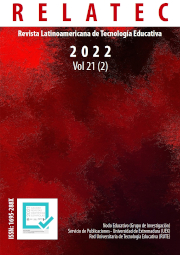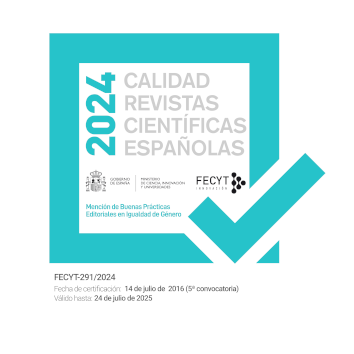O Uso da Teoria da Autodeterminação no Contexto da Gamificação. Uma Revisão de Literatura
DOI:
https://doi.org/10.17398/1695-288X.21.2.59Palavras-chave:
Revisão de Literatura, Autodeterminação, Motivação Intrínseca, Motivação Extrínseca, Aprendizagem Baseada em JogosResumo
A gamificação pode ser definida como o uso de elementos de jogos fora do seu cenário de origem, com intuito de transformar determinadas atividades em processos interessantes e envolventes. Contudo, para que isso ocorra se faz necessário um planejamento estratégico na elaboração de um ambiente gamificado, visando principalmente a motivação, pois esta pode auxiliar na permanência do sujeito na atividade. A Teoria da Autodeterminação foi concebida com o intuito de estudar os vínculos existentes entre a personalidade, a motivação humana e o funcionamento ótimo. Apresentando dois tipos de motivação, a intrínseca e a extrínseca. Foi a partir de tais constructos que a teoria passou a ser trabalhada no contexto da gamificação. Com base na junção dessas temáticas, foi elaborado um mapeamento, para compreender como se dá o uso da SDT no contexto da gamificação. Para a busca dos dados foram consideradas 11 bases de informações eletrônicas. Para esse estudo também foram considerados artigos e trabalhos publicados em anais. Os quais foram submetidos a critérios de exclusão, o banco final resultou em 62 estudos, publicados entre 2014 e 2020 e analisados com auxílio do software Iramuteq. Constatou-se que a SDT associada à gamificação começou a ser explorada em 2014 e posteriormente outros trabalhos foram desenvolvidos. Trata-se de uma área que vem crescendo nos últimos anos, vinculando-se a áreas como educação, saúde e trabalho.
Downloads
Referências
Ahn, S. J., Johnsen, K., & Ball, C. (2019). Points-based reward systems in gamification impact children’s physical activity strategies and psychological needs. Health Education & Behavior, 46(3), 417-425.https://doi.org/10.1177/1090198118818241
Attig, C., & Franke, T. (2019). I track, therefore I walk–Exploring the motivational costs of wearing activity trackers in actual users. International Journal of Human-Computer Studies, 127, 211-224. https://doi.org/10.1016/j.ijhcs.2018.04.007
BasirianJahromi, R., Bigdeli, Z., Haidari, G., & HajiYakhchali, A. (2017). Designing and applying librarygame website software and investigating its impact on self-determination factors of library users. Iranian Journal of Information Processing Management, 33(1), 361-386.
Bissolotti, K., Nogueira, H. G., & Pereira, A. T. C. (2014). Potencialidades das mídias sociais e da gamificação na educação a distância. Renote, 12(2). https://doi.org/10.22456/1679-1916.53511
Bovermann, K., & Bastiaens, T. J. (2020). Towards a motivational design? Connecting gamification user types and online learning activities. Research and Practice in Technology Enhanced Learning, 15(1), 1-18.
Camargo, B. V. (2005) Alceste: Um programa informático de análise quantitativa de dados textuais. In Moreira, A. S. P., Camargo, B. V., Jesuíno, J. C., Nóbrega, S. M. (Eds.). Perspectivas teórico-metodológicas em representações sociais. Editora da UFPB. pp. 511–539.
Corepal, R., Best, P., O’Neill, R., Kee, F., Badham, J., Dunne, L., ... & Hunter, R. F. (2019). A feasibility study of ‘The StepSmart Challenge’to promote physical activity in adolescents. Pilot and feasibility studies, 5(1), 1-15.
Creswell, J. W. (ed). (2007). Projeto de pesquisa: métodos qualitativo, quantitativo e misto. 2. ed. Artmed.
Chen, X., Li, X., Lee, S. Y. C., & Chu, S. K. (2018). Re‐examining students' reading experience in a gamified context from a self‐determination perspective: A multiple‐case study. Proceedings of the Association for Information Science and Technology, 55(1), 66-75. https://doi.org/10.1002/pra2.2018.14505501008
Dimitriadou, S. (2017). Designing and implementing a gamified system based on STD in the Moodle learning platform. Proc. INTED2017, 3707-3714.
Deci, E. L., & Ryan, R. M. (2000). The ‘what” and “why” of goal pursuits: human needs and the self-determination of behavior. Psychological Inquiry, 11(4), 227–268. https://doi.org/10.1207/S15327965PLI1104_01
Deterding, S. (2016). Contextual autonomy support in video game play: a grounded theory. In Proceedings of the 2016 chi conference on human factors in computing systems (pp. 3931-3943). https://doi.org/10.1145/2858036.2858395
Frost., R. D, Matta., V., & MacIvor., E. (2015). Assessing the efficacy of incorporating game dynamics in a learning management system. Journal of Information Systems Education, 26(1), 59–70. http://jise.org/Volume26/n1/JISEv26n1p59.pdf
Garrett, S. D., & Young, R. (2018). Health Care Gamification: A Study of Game Mechanics and Elements. Technology, Knowledge and Learning, 24, 341–353. https://doi.org/10.1007/s10758-018-9353-4.
Gurjanow, I., Oliveira, M., Zender, J., Santos, P. A., & Ludwig, M. (2019). Mathematics trails: Shallow and deep gamification. International Journal of Serious Games, 6(3), 65-79. https://doi.org/10.17083/ijsg.v6i3.306
Grau, P., Naderi, B., & Kim, J. (2018). Personalized Motivation-supportive Messages for Increasing Participation in Crowd-civic Systems. Proceedings of the ACM on Human-Computer Interaction, 2(CSCW), 1-22. https://doi.org/10.1145/3274329
Handani, S. W., & Kusuma, T. P. P. (2018, November). Comparing Learning Media Applications Using Gamification Theory. In 2018 3rd International Conference on Information Technology, Information System and Electrical Engineering (ICITISEE) (pp. 37-42). IEEE. https://doi.org/10.1109/ICITISEE.2018.8720994
Haque, M. S., Jämsä, T., & Kangas, M. (2017). A Theory-Driven System Model to Promote Physical Activity in the Working Environment with a Persuasive and Gamified Application. In DDGD@ MindTrek (pp. 37-44).
Hew, F. K., Huang, B., Chu, K. W. S., & Chiu, D. K. W. (2015). Engaging Asian students through game mechanics: Findings from two experiment studies. Computers & Education, 92(93), 221–236. https://doi.org/10.1016/j.compedu.2015.10.010
He, X., Yan, H., & Song, X. (2019, December). The Effects of Rewards Mechanisms On the Game-based Chinese Learning System. In 2019 12th International Symposium on Computational Intelligence and Design (ISCID) (Vol. 1, pp. 113-116). IEEE. https://doi.org/10.1109/ISCID.2019.00032
Hew, K. F., Huang, B., Chu, K. W. S., & Chiu, D. K. (2016). Engaging Asian students through game mechanics: Findings from two experiment studies. Computers & Education, 92, 221-236. https://doi.org/10.1016/j.compedu.2015.10.010
Ilhan, A. (2018, July). Motivations to Join Fitness Communities on Facebook: Which Gratifications Are Sought and Obtained?. In International Conference on Social Computing and Social Media (pp. 50-67). Springer, Cham. https://doi.org/10.1007/978-3-319-91485-5_4
Jozani, M. M., Maasberg, M., & Ayaburi, E. (2018, July). Slayers vs Slackers: An Examination of Users’ Competitive Differences in Gamified IT Platforms Based on Hedonic Motivation System Model. In International Conference on Learning and Collaboration Technologies (pp. 164-172). Springer, Cham. https://doi.org/10.1007/978-3-319-91152-6_13
Kasurinen, J., & Knutas, A. (2018). Publication trends in gamification: A systematic mapping study. Computer Science Review, 27, 33-44. https://doi.org/10.1016/j.cosrev.2017.10.003
Kalat, J. W. (2011). Introduction to Psychology, (International edition). Wadsworth Cengage Learning.
Kaleta., J. P., Kettinger, & W. J., Zhang, C. (2014). Achieving business goals with gamification: An informational and motivational perspective. 20th Americas Conference on Information Systems, AMCIS. https://aisel.aisnet.org/cgi/viewcontent.cgi?article=1565&context=amcis2014
Kapp, K. M. (2012). The gamification of learning and instruction: game-based methods and strategies for training and education. Pfeiffer. https://absel-ojs-ttu.tdl.org/absel/index.php/absel/article/view/40
Kitchenham, B. (2007). Guidelines for performing Systematic Literature Reviews in Software Engineering, Version 2.3, EBSE Technical Report EBSE-2007-01, Keele University and University of Durham.
Korn, O. & Tietz, S. (2017). Strategies for Playful Design when Gamifying Rehabilitation. A Study on User Experience. Petra ’17, 209–214. http://doi.org/10.1145/3056540.3056550
Klock, A. C. T., de Carvalho, M. F., Rosa, B. E., & Gasparini, I. (2014). Análise das técnicas de Gamificação em Ambientes Virtuais de Aprendizagem. Renote, 12(2).https://doi.org/10.22456/1679-1916.53496
Kim, J., & Castelli, DM (2021). Efeitos da Gamificação na Mudança Comportamental na Educação: Uma Meta-análise. Jornal Internacional de Pesquisa Ambiental e Saúde Pública , 18 (7), 3550. MDPI AG. http://dx.doi.org/10.3390/ijerph18073550
Lamprinou, D., & Paraskeva, F. (2015). Gamification design framework based on SDT for student motivation. International Conference on Interactive Mobile Communication Technologies and Learning (IMCL), 406–410. http://doi.org./10.1109/IMCTL.2015.7359631
Lo, C. K., & Hew, K. F. (2020). A comparison of flipped learning with gamification, traditional learning, and online independent study: the effects on students’ mathematics achievement and cognitive engagement. Interactive Learning Environments, 28(4), 464-481. https://doi.org/10.1080/10494820.2018.1541910
Lemus, B. A., & Pinto, R. (2014). Designing, building and preliminary results of “Cerebrex”, a serious educational videogame. In Proceedings Conference and Trends (InPACT) (pp. 1-5).
Mahmud, S. N. D., Husnin, H., & Tuan Soh, T. M. (2020). Teaching presence in online gamified education for sustainability learning. Sustainability, 12(9), 3801. https://doi.org/10.3390/su12093801
Marins, D. R. (2013). Um processo de Gamificação Baseado na Teoria da Autodeterminação. [Dissertação de Mestrado, COPPE, Universidade Federal do Rio de Janeiro]. https://www.cos.ufrj.br/uploadfile/1387465246.pdf
Menezes, C. C. N., & Bortoli, R. (2018). Gamificação: surgimento e consolidação. C&S – São Bernardo do Campo, 40(1), 267–297. https://doi.org/10.15603/2175-7755/cs.v40n1p267-297
Nacke, L., Deterding, S. (2017). The maturing of gamification research. Computers in Human Behavior, 71, 450–-454. http://doi.org/10.1016/j.chb.2016.11.062
Nurmi, J., Knittle, K., Ginchev, T., Khattak, F., Helf, C., Zwickl, P., ... & Haukkala, A. (2020). Engaging users in the behavior change process with digitalized motivational interviewing and gamification: development and feasibility testing of the precious app. JMIR mHealth and uHealth, 8(1), e12884. http://doi.org/10.2196/12884
Perryer, C., Celestine, N. A., Scott-Ladd, B., & Leighton, C. (2016). Enhancing workplace motivation through gamification: Transferrable lessons from pedagogy. The International Journal of Management Education, 14(3), 327-335. https://doi.org/10.1016/j.ijme.2016.07.001
Pilkington, C. (2018). A playful approach to fostering motivation in a distance education computer programming course: Behaviour change and student perceptions. The International Review of Research in Open and Distributed Learning, 19(3). https://doi.org/10.19173/irrodl.v19i3.3664
Poffo, M., & Agostini Volani, E. (2018). Gamificação para motivar o aprendizado. CIET:EnPED, . Recuperado de https://cietenped.ufscar.br/submissao/index.php/2018/article/view/268
Plangger, K., Campbell, C., Robson, K., & Montecchi, M. (2019). Little rewards, big changes: Using exercise analytics to motivate sustainable changes in physical activity. Information & Management, 103216.https://doi.org/10.1016/j.im.2019.103216
Proulx, J. N., & Romero, M. (2015, December). Game and Learning Mechanics Under the Perspective of Self-determination Theory for Supporting Motivation in Digital Game Based Learning. In International Conference on Games and Learning Alliance (pp. 141-150). Springer, Cham. https://doi.org/10.1007/978-3-319-40216-1_15
Prabowo, R., Sucahyo, Y. G., Gandhi, A., & Ruldeviyani, Y. (2019, October). Does gamification motivate gig workers? a critical issue in ride-sharing industries. In 2019 International Conference on Advanced Computer Science and information Systems (ICACSIS) (pp. 343-348). IEEE. https://doi.org/10.1109/ICACSIS47736.2019.8979938
Ratinaud, P. (2009). Iramuteq: Interface de R pour les Analyses Multidimensionnelles de Textes et de Questionnaires [Softuware de Computador]. http://www.iramuteq.org
Romano, M., Díaz, P., & Aedo, I. (2016, October). Emergency management and smart cities: Civic engagement through gamification. In International Conference on Information Systems for Crisis Response and Management in Mediterranean Countries (pp. 3-14). Springer, Cham. https://doi.org/10.1007/978-3-319-47093-1_1
Rutledge, C., Walsh, C. M., Swinger, N., Auerbach, M., Castro, D., Dewan, M., ... & Chang, T. P. (2018). Gamification in action: theoretical and practical considerations for medical educators. Academic Medicine, 93(7), 1014-1020. https://doi.org/10.1097/ACM.0000000000002183
Schöbel, S. & Söllner, M. (2016). How to Gamify Information Systems – Adapting Gamification to Individual User Preferences. Twenty-Fourth European Conference on Information Systems (ECIS). Istanbul, Turkey. http://pubs.wi-kassel.de/wp-content/uploads/2016/07/JML_553.pdf
Shi, L., Cristea, A. I., Hadzidedic, S., & Dervishalidovic, N. (2014). Contextual Gamification of Social Interaction – Towards Increasing Motivation in Social E-learning. The 13th International Conference on Web-based Learning (ICWL2014), 116–122. https://doi.org/10.1007/978-3-319-09635-3_12
Tang, J., & Prestopnik, N. R. (2017). Effects of framing on user contribution: Story, gameplay and science. Faculty Articles Indexed in Scopus. 530. https://digitalcommons.ithaca.edu/scopus_articles/530
Tolentino, A. N., & Roleda, L. S. (2019, January). Gamified physics instruction in a reformatory classroom context. In Proceedings of the 10th International Conference on E-Education, E-Business, E-Management and E-Learning (pp. 135-140). https://doi.org/10.1145/3306500.3306527.
Tolks, D., Lampert, C., Dadaczynski, K., Maslon, E., Paulus, P., & Sailer, M. (2020). Spielerische Ansätze in Prävention und Gesundheitsförderung: Serious Games und Gamification. Bundesgesundheitsbl Gesundheitsforsch Gesundheitsschutz, 63(6), 698-707.
Downloads
Publicado
Edição
Secção
Licença
Los autores/as que publiquen en esta revista aceptan las siguientes condiciones:
1. Los autores/as conservan los derechos de autor y ceden a la revista el derecho de la primera publicación, con el trabajo registrado con la licencia Creative Commons Reconocimiento-NoComercial-SinObraDerivada 4.0 International (CC BY-NC-ND), que permite a terceros utilizar lo publicado siempre que mencionen la autoría del trabajo y a la primera publicación en esta revista.
2. Los autores/as pueden realizar otros acuerdos contractuales independientes y adicionales para la distribución no exclusiva de la versión del artículo publicado en esta revista (p. ej., incluirlo en un repositorio institucional o publicarlo en un libro) siempre que indiquen claramente que el trabajo se publicó por primera vez en esta revista.
3. Se permite y recomienda a los autores/as a publicar su trabajo en Internet (por ejemplo en páginas institucionales o personales) antes y durante el proceso de revisión y publicación, ya que puede conducir a intercambios productivos y a una mayor y más rápida difusión del trabajo publicado (vea The Effect of Open Access).









